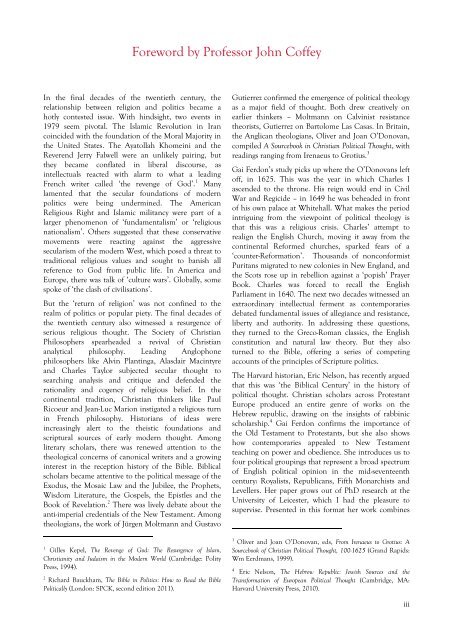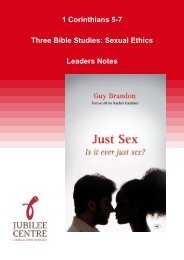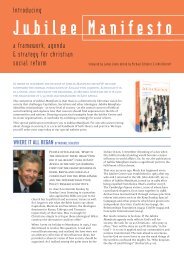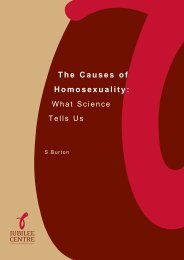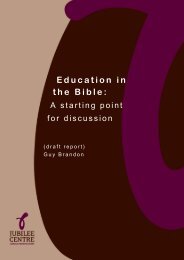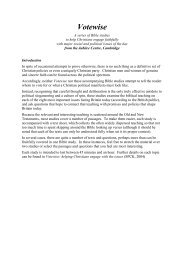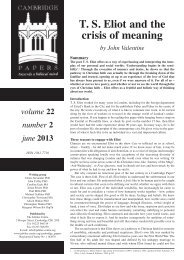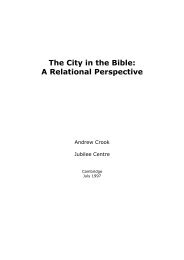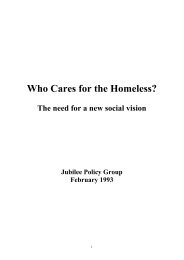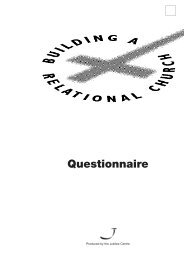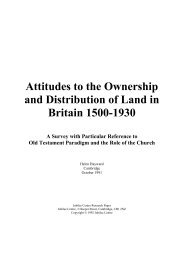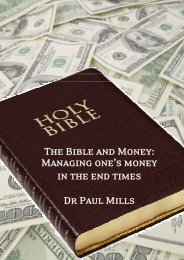Report Template - Jubilee Centre
Report Template - Jubilee Centre
Report Template - Jubilee Centre
You also want an ePaper? Increase the reach of your titles
YUMPU automatically turns print PDFs into web optimized ePapers that Google loves.
Foreword by Professor John Coffey<br />
In the final decades of the twentieth century, the<br />
relationship between religion and politics became a<br />
hotly contested issue. With hindsight, two events in<br />
1979 seem pivotal. The Islamic Revolution in Iran<br />
coincided with the foundation of the Moral Majority in<br />
the United States. The Ayatollah Khomeini and the<br />
Reverend Jerry Falwell were an unlikely pairing, but<br />
they became conflated in liberal discourse, as<br />
intellectuals reacted with alarm to what a leading<br />
French writer called ‘the revenge of God’. 1 Many<br />
lamented that the secular foundations of modern<br />
politics were being undermined. The American<br />
Religious Right and Islamic militancy were part of a<br />
larger phenomenon of ‘fundamentalism’ or ‘religious<br />
nationalism’. Others suggested that these conservative<br />
movements were reacting against the aggressive<br />
secularism of the modern West, which posed a threat to<br />
traditional religious values and sought to banish all<br />
reference to God from public life. In America and<br />
Europe, there was talk of ‘culture wars’. Globally, some<br />
spoke of ‘the clash of civilisations’.<br />
But the ‘return of religion’ was not confined to the<br />
realm of politics or popular piety. The final decades of<br />
the twentieth century also witnessed a resurgence of<br />
serious religious thought. The Society of Christian<br />
Philosophers spearheaded a revival of Christian<br />
analytical philosophy. Leading Anglophone<br />
philosophers like Alvin Plantinga, Alasdair Macintyre<br />
and Charles Taylor subjected secular thought to<br />
searching analysis and critique and defended the<br />
rationality and cogency of religious belief. In the<br />
continental tradition, Christian thinkers like Paul<br />
Ricoeur and Jean-Luc Marion instigated a religious turn<br />
in French philosophy. Historians of ideas were<br />
increasingly alert to the theistic foundations and<br />
scriptural sources of early modern thought. Among<br />
literary scholars, there was renewed attention to the<br />
theological concerns of canonical writers and a growing<br />
interest in the reception history of the Bible. Biblical<br />
scholars became attentive to the political message of the<br />
Exodus, the Mosaic Law and the <strong>Jubilee</strong>, the Prophets,<br />
Wisdom Literature, the Gospels, the Epistles and the<br />
Book of Revelation. 2 There was lively debate about the<br />
anti-imperial credentials of the New Testament. Among<br />
theologians, the work of Jürgen Moltmann and Gustavo<br />
1<br />
Gilles Kepel, The Revenge of God: The Resurgence of Islam,<br />
Christianity and Judaism in the Modern World (Cambridge: Polity<br />
Press, 1994).<br />
2<br />
Richard Bauckham, The Bible in Politics: How to Read the Bible<br />
Politically (London: SPCK, second edition 2011).<br />
Gutierrez confirmed the emergence of political theology<br />
as a major field of thought. Both drew creatively on<br />
earlier thinkers – Moltmann on Calvinist resistance<br />
theorists, Gutierrez on Bartolome Las Casas. In Britain,<br />
the Anglican theologians, Oliver and Joan O’Donovan,<br />
compiled A Sourcebook in Christian Political Thought, with<br />
readings ranging from Irenaeus to Grotius. 3<br />
Gai Ferdon’s study picks up where the O’Donovans left<br />
off, in 1625. This was the year in which Charles I<br />
ascended to the throne. His reign would end in Civil<br />
War and Regicide – in 1649 he was beheaded in front<br />
of his own palace at Whitehall. What makes the period<br />
intriguing from the viewpoint of political theology is<br />
that this was a religious crisis. Charles’ attempt to<br />
realign the English Church, moving it away from the<br />
continental Reformed churches, sparked fears of a<br />
‘counter-Reformation’. Thousands of nonconformist<br />
Puritans migrated to new colonies in New England, and<br />
the Scots rose up in rebellion against a ‘popish’ Prayer<br />
Book. Charles was forced to recall the English<br />
Parliament in 1640. The next two decades witnessed an<br />
extraordinary intellectual ferment as contemporaries<br />
debated fundamental issues of allegiance and resistance,<br />
liberty and authority. In addressing these questions,<br />
they turned to the Greco-Roman classics, the English<br />
constitution and natural law theory. But they also<br />
turned to the Bible, offering a series of competing<br />
accounts of the principles of Scripture politics.<br />
The Harvard historian, Eric Nelson, has recently argued<br />
that this was ‘the Biblical Century’ in the history of<br />
political thought. Christian scholars across Protestant<br />
Europe produced an entire genre of works on the<br />
Hebrew republic, drawing on the insights of rabbinic<br />
scholarship. 4 Gai Ferdon confirms the importance of<br />
the Old Testament to Protestants, but she also shows<br />
how contemporaries appealed to New Testament<br />
teaching on power and obedience. She introduces us to<br />
four political groupings that represent a broad spectrum<br />
of English political opinion in the mid-seventeenth<br />
century: Royalists, Republicans, Fifth Monarchists and<br />
Levellers. Her paper grows out of PhD research at the<br />
University of Leicester, which I had the pleasure to<br />
supervise. Presented in this format her work combines<br />
3<br />
Oliver and Joan O’Donovan, eds, From Irenaeus to Grotius: A<br />
Sourcebook of Christian Political Thought, 100-1625 (Grand Rapids:<br />
Wm Eerdmans, 1999).<br />
4<br />
Eric Nelson, The Hebrew Republic: Jewish Sources and the<br />
Transformation of European Political Thought (Cambridge, MA:<br />
Harvard University Press, 2010).<br />
iii


